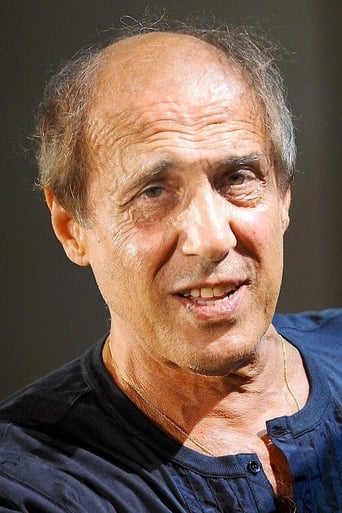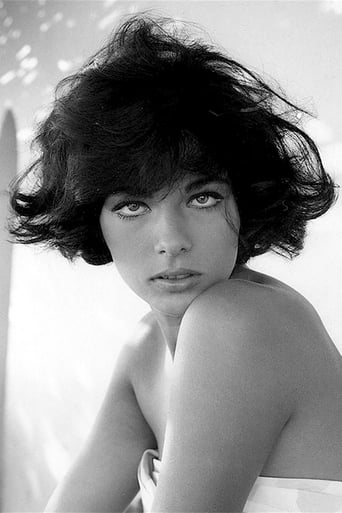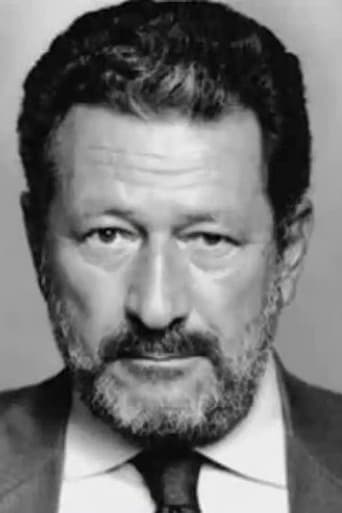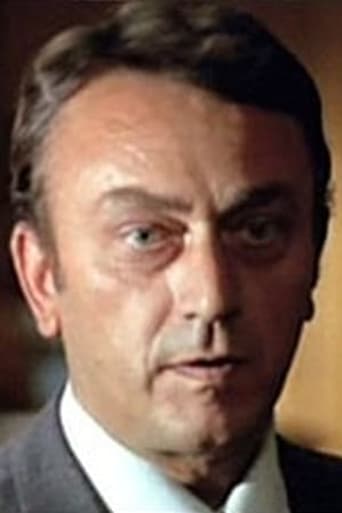Mjeteconer
Just perfect...
TrueHello
Fun premise, good actors, bad writing. This film seemed to have potential at the beginning but it quickly devolves into a trite action film. Ultimately it's very boring.
FirstWitch
A movie that not only functions as a solid scarefest but a razor-sharp satire.
Jenna Walter
The film may be flawed, but its message is not.
lchadbou-326-26592
The Five Days as has been pointed out is an atypical Dario Argento: a lighthearted take on the politics of Italy in the year, tumultuous across Europe, of 1848, with the conflicting interests shown of Northern Italian rebels,Austrian occupiers, and the Pope,to name just three.It is also a buddy film as the two main characters, an escaped convict and a baker, land up bonding through a series of violent but comic episodes.Highlights include a silent style slapstick scene in which the two, naive about a woman's body, try to help with a childbirth; an argument over what a dying hero's last words were which turns physical; and especially a tryst with the blonde widow of a recently hung traitor, who gets sexually excited as the baker describes different kinds of bread.The convict has been looking all through the story for an elusive friend Zampino, who is supposedly a hero nicknamed Liberty but is actually double-crossing the rebels and working for the Austrians. The leader of one band of rebels, called "Duce,"a name which has an obvious connotation, is thrown down a flight of stairs when the baker tries to stop him from raping a woman who had sex with an Austrian.The convict's words at the end, as he ventures to speak before a crowd gathered to celebrate a victory, the new bigwigs pompously dressed up, are "We've been tricked." Some may see in this irony and cynicism Argento and his co-writers' critique of a similar wave of radical politics that swept through Europe- and elsewhere- just 5 years before the movie, in 1968. In any event the work invites interesting comparisons with the historical/war comedies of Mario Monicelli (The Great War, L'Armata Brancaleone) the sexual politics of Lina Wertmuller, and even the more serious historical epics of Luchino Visconti (Senso) rather than the horror genre in which Argento is usually pigeonholed.
Red-Barracuda
I have been aware of this film for many, many years now. Yet I always used to forget it existed when I thought of Dario Argento's filmography. I guess he is such am auteur that it seemed really bizarre that he would direct a historical comedy. Having said that, he did seem to have a penchant for including comedy into most of his his gialli and horror films. But with the odd exceptions such as the comic interplay between David Hemmings and Daria Nicolodi in Deep Red, I have to say that his attempts at humour always seemed really clunky. So for this reason, I never really made any attempt to seek The Five Days of Milan out. As it turned out, a fellow IMDb user kindly sorted me out a copy of the film and I was finally able to check it out for myself.During the final days of the Italian revolution a thief escapes from jail in the chaos. He hooks up with a baker and they travel the streets of Milan together witnessing the historic events. Unfortunately, the idealism of the revolution quickly turns to hypocrisy, rape and murder.As it turned out this was Argento's only film to move away from the giallo/horror genres. It wasn't successful seemingly but it isn't necessarily difficult to understand why. It has a wildly varying tone that veers from slapstick to brutal rape. This must've been quite disconcerting for many at the time. The comedy isn't particularly funny to be perfectly honest; although this didn't really surprise me too much given my experience with Argento's other films. But the more sober and serious material is quite effectively handled at times. And the film does seem to have pretty decent production values and does look pretty good as well. Argento's stylistic approach is massively reduced to fit the period film aesthetics, which is a shame in some ways but probably sensible overall. It's a movie that has very Italian specific subject matter and was no doubt only ever conceived of serving the domestic market, so from a non-Italian's point-of-view it doesn't fully make a connection at times. Nevertheless, I have to say that it was a movie that I found more rewarding and interesting than I ever thought I would.
morrison-dylan-fan
After having watched the two brilliant Argento-directed episodes of his sadly forgotten,short-lived Giallo TV show Door Into Darkness,I went to check on his IMDb page to see what Giallo Dario had made as a follow up to the series.To my surprise,I discovered the in 1973,Argento had decided that with the last of his "Giallo Animal Trilogy" (Four Flies On Grey Velvet) he had taken the genre to its absolute peak,(although,after the box office failure of this film,Argento would rush back to the genre with the highly acclaimed Deep Red) and that now was the perfect time for him to deliver a historical epic.Checking for the film on Amazon UK,I was thrilled to find that the movie had recently come out on DVD.Sadly,when the parcel arrived,I discovered that the DVD did not have an English soundtrack or English Subtitles!.Having originally given up on finding an English version of the film,my determination to get my hands on the film got a huge boost,when I began talking to an Amazon UK customer,who had spent some time trying to find an English version of the film.Now knowing that I was not the only person in the UK searching for Argento's lost film,I spent the next month looking in every direction of the internet in the faint hope that I would find an English version of the film,in the internet wilderness.Where,five days ago (not of Milan!),I unbelievably discovered,what I hope would be a piece of Dario Argento's lost past.The plot:As Italy becomes engulfed in a bubbling revolution to finally get rid of the ruling Austrian's,a patriotic prisoner called Cainazzo begins to wonder if he will soon get the chance to see the revolution in action away from his prison cell.Suddenly,a cannon ball comes flying through the air and knocks the main wall of the prison down. Excited, in at last having the chance to see the change taking place in person,Cainazzo hits a bumpy road,when one of his former fellow prisoner yells out to all the revolutionary gangs that Cainazzo is not a patriot,but is in fact a traitor.Running for his survival,Cainazzo eventually finds a quiet bakery to hide in.Shortly after the baker, Marcelli Romolo accidentally implodes the building.Surviving the explosion,Cainazzo is stunned when he finds that Romolo is alive,and that he now wants both of them to join up as a team!.Half-heartedly agreeing to his request,Cainazzo and Marcelli start travailing around Milan to see the revolution happening around them.As they get deeper in seeing the people behind the revolution,Marcelli and Cainazzo start to have serious doubts about the main rebels fighting for the "common man",who they begin to suspect are more interested in lining their own pockets,then giving power back to the people of Milan…View on the film:For his strong directing,Argento takes an interestingly measured,elegant approach to the film,with his highly stylish camera moves being toned down,and replaced with some poignant moments of slow-motion (which seem to be used to show that death/dying is the only thing that can block out the sounds of chaos around the characters struggle with the so- called "revolution")and some moments of sped-up music,which oddly recall the soundtrack of Stanley Kubrick's A Clockwork Orange (who would also do a period film shortly after the making of Five Days called Barry Lyndon.)With the strong screenplay being spilt into chapters,Argento shows a surprisingly comedic side for the first half of the film,with some of the scenes between the two main characters and the other residents of Milan almost turning into brilliant bits of silent comedy!.And although initially my reaction with the many comedy moments of the first half was one of uneasiness. (Due to it being very different from the other Argento films I have seen before)Looking at the film as a whole,actually shows those moments to be one of the main brilliant things about the film,due to Argento smartly using the humour to make the bond between Marcelli and Cainazzo very easy for the audience to connect with,thanks to Argento showing the friendship develop during their meetings with the other residents of Milan,as the landscape in Milan turns into a much bleaker place.Having built up the friendship of Marcelli and Cainazzo.Argento stunningly uses the second half of the film,to show the far from well-meaning revolution taking place around them.One of the main things,that almost bookend the changing mood of the film is Argento's use of babies,from the first section of the film,where it is shown that new lives can start during a revolution,to the second half,where a child's family is completely destroyed due to the deeply corrupt revolution choking the life out of all of the citizen's that it engulfs.Along with the destruction of new life,Dario also shows in one of the strongest scenes of the film,that no matter how much any new leader says that they are going to make sure that none of the residents are just "dirt on the shoes",the in the end,no one lower down the ladder will ever be offered a seat at the main table.Argento shows this idea,by impressively doing a scene where Cainazzo is hiding under a banquet table,and secretly staring at the shoes of the future high and mighty.which allows Cainazzo the only opportunity to see the "true" face of the people,who instead of changing Milan for the better,may actually change it into something worser than it ever was
marquis de cinema
Dario Argento wanted to do something different after completing the Animal trilogy. He wanted to do a film that got away from the confines of the giallo and was for the Italian viewer only. Dario decided for this kind of film to be a period piece called Le Cinque Giornate/Five Days in Milan(1973). Dario's work on the excellent Once Upon a Time in the West(1969) played a big part in the making of the movie.
Five Days in Milan(1973) shares many traits with a Sergio Leone film known as A Fistful of Dynamite(1972). The story takes place during the Italian Revolution of 1848. It tried to copy the style of The Wild Bunch(1969) without the same results of success. The story by Dario Argento is not as good as some of the stories for his best Giallos.
The acting is average and the acting of the lead actor is not very good. The director did this film because of a feeling that the Giallo had run its course and was done. Argento tried to do a remake of Frankenstein before embarking to do another Giallo that would be better then the three previous ones of Bird With The Crystal Plumage(1969), Cat O'Nine Tails(1970), and 4 Flies on Grey Velvet(1972). Five Days of Milan(1973) is an unique film by Dario Argento that is for Dario Argento fans only.





